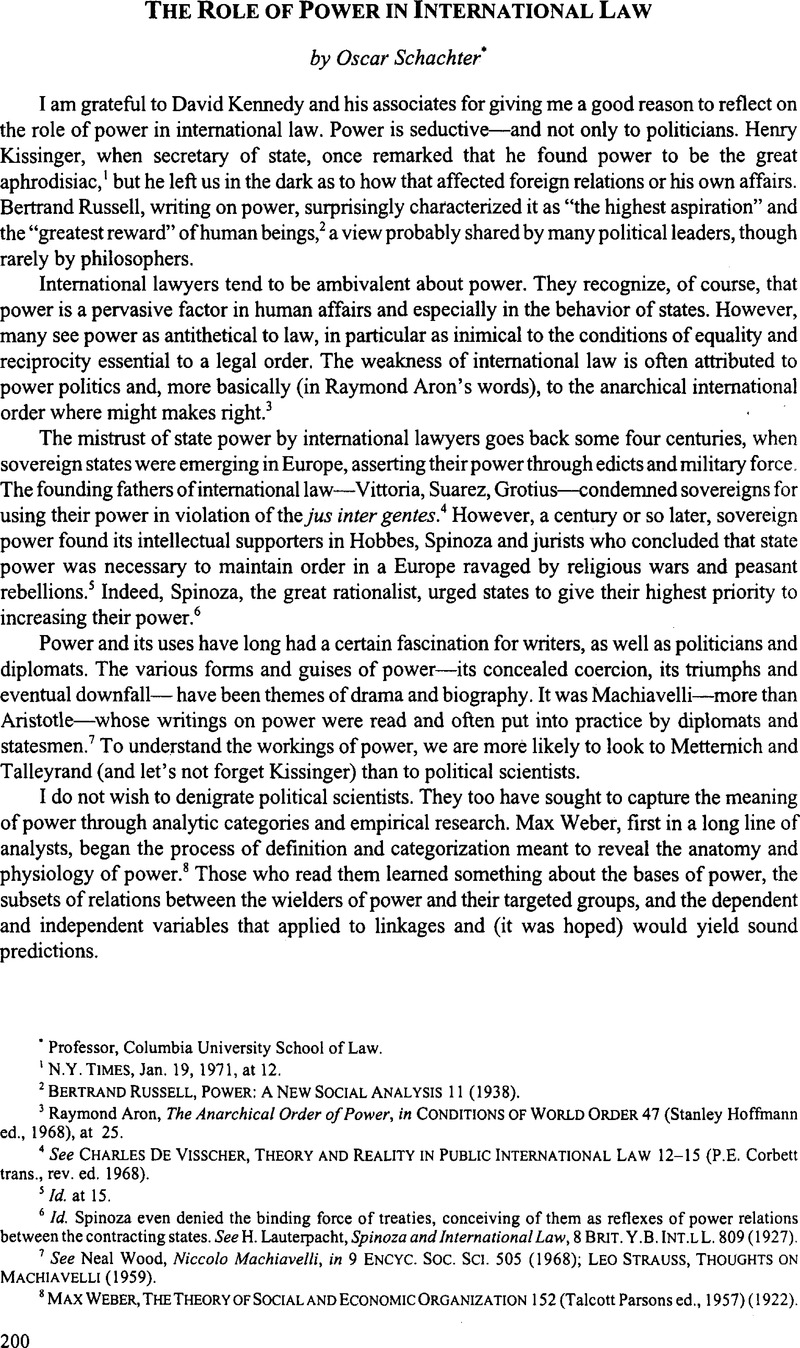Published online by Cambridge University Press: 28 February 2017

1 N.Y. Times, Jan. 19, 1971, at 12.
2 Bertrand Russell, Power: A New Social Analysis 11 (1938).
3 Aron, Raymond, The Anarchical Order of Power, in Conditions of World Order 47 (Hoffmann, Stanley ed., 1968), at 25 Google Scholar.
4 See De Visscher, Charles, Theory and Reality in Public International Law 12–15 (Corbett, P.E. trans., rev. ed. 1968)CrossRefGoogle Scholar.
5 Id. at 15.
6 Id. Spinoza even denied the binding force of treaties, conceiving of them as reflexes of power relations between the contracting states. See Lauterpacht, H., Spinoza and International Law, 8 Brit. Y.B. Int.l L. 809 (1927)Google Scholar.
7 See Wood, Neal, Niccolo Machiavelli, in 9 Encyc. Soc. Sci. 505 (1968)Google Scholar; Leo Strauss, Thoughts on Machiavelli (1959).
8 Weber, Max, The Theory of Social and Economic Organization 152 (Parsons, Talcott ed., 1957)Google Scholar (1922).
9 See, e.g., F.H. Hinsley, Power and the Pursuit of Peace (1963); Robert Keohane, International Institutions and State Power (1989); Morton Kaplan & Nicholas Katzenbach, the Political Foundations of International Law (1961); Kenneth Waltz, Theory of International Politics (1971).
10 McDougal, M.S. & Reisman, W. M., International Law in Policy-Oriented Perspective, in The Structure and Process of International Law 231 (MacDonald, R. St. J. & Johnston, D.M. eds., abridged ed., 1989), at 215 Google Scholar.
11 De Visscher, supra note 4.
12 Id. at 154.
13 Id. at 155.
14 Id.
15 Id. at 157.
16 Id. at 159.
17 Id.
18 See Schachter, O., The Decline of the Nation-State and Its Implications for International Law, 36 Colum. J. Transnat’l L. 7 (1997)Google Scholar.
19 See Knop, Karen, Of the Male Persuasion: The Power of Liberal Internationalism for Women, 93 ASIL Proc. (1999)Google Scholar.
20 The International Campaign to Ban Land Mines and Its Leader, Jody Williams, Received the Nobel Peace Prize in 1997.
21 Amnesty International and Human Rights Watch Were Particularly Active.
22 See Schachter, Oscar, Law-Making in the United Nations, in Perspectives on International Law 120, 135-36 (Jasentuliyana, N. ed., 1997)Google Scholar.
23 Byers, Michael, Custom, Power and the Power of Rules, 17 Mich. J. Int’l L. 109 (1995)Google Scholar.
24 See, e.g., H. Kelsen, the Law of the United Nations Xv (1950): “The choice of interpretation as a law-making act is determined by political motives. It is not the logically true, it is the politically preferable meaning of the interpreted norm which becomes binding.”
25 See, e.g., Kingsbury, Benedict A Concept of Compliance as a Function of Competing Conception of Int ‘I Law 19 Mich. J. Int’l L. 345, 358 (1998)Google Scholar.